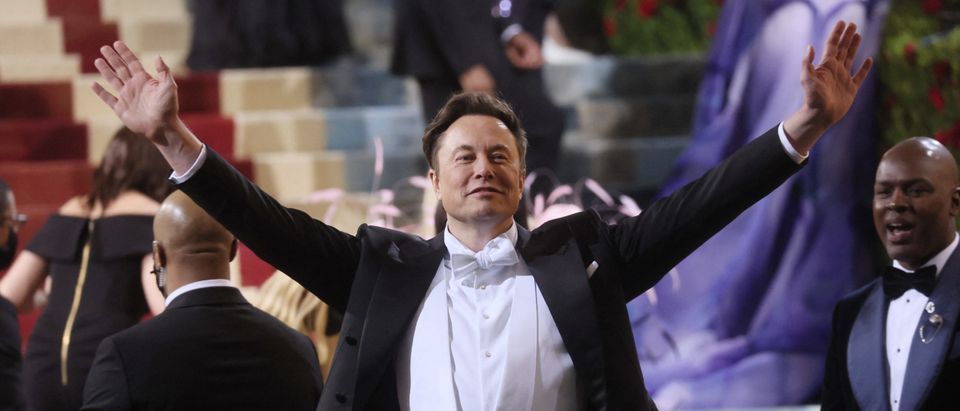We’re confused. Elon Musk, once a great paragon of the left’s crusade against evil fossil fuels, is now apparently a racist with white privilege because he disagrees with leftist institutions curtailing legitimate speech.
They’ll tell you it’s about Russian bots or something, but really it’s about Hunter Biden’s laptop, whether men can have children, or if we should chemically castrate confused children. That’s what they’re actually after, and in order to kill that debate, they must kill Elon Musk’s character first.
Obviously, the best and only way the left — exemplified and represented most officially by the New York Times (NYT) — assassinates someone’s character is to call them a racist.
At the expense of Musk’s character through no fault of his own, the NYT takes readers on an exploration as to how Musk, who is white, was “shaped” under the apartheid system in South Africa and somehow is therefore incapable of believing in free speech.
In less words, the NYT is asking what everyone clearly wants to know: why did Musk, as a child, not single-handedly abolish apartheid?
Elon Musk grew up in elite white communities in South Africa, detached from apartheid’s atrocities and surrounded by anti-Black propaganda.
He sees his takeover of Twitter as a free speech win but in his youth did not suffer the effects of misinformation. https://t.co/bciCJDWGGP
— The New York Times (@nytimes) May 5, 2022
Overnight, Musk became the poster boy for apartheid as the NYT brandished its pen with the hope of casting Musk as a proponent of segregation. Of course, the Times then concedes that Musk was just about the complete opposite of everything they opined. One must assume the Times hoped that like most of their pieces, their readers would tune out after the fifth boring paragraph rather than read until the end.
“Mr. Musk, 50, grew up in the economic hub of Johannesburg, the executive capital of Pretoria and the coastal city of Durban,” the Times writes. “His suburban communities were largely shrouded in misinformation. Newspapers sometimes arrived on doorsteps with whole sections blacked out, and nightly news bulletins ended with the national anthem and an image of the national flag flapping as the names of white young men who were killed fighting for the government rolled on the screen.”
When Musk announced his bid for Twitter, he did so under the guise that it serves as the “de facto public square.” Musk, who reportedly grew up in a community “shrouded in misinformation,” appears to have made his offer for the platform in the hopes to avoid the type of world he grew up in, not replicate it as the Times would want you to believe.
“Mr. Musk heralded his purchase of Twitter as a victory for free speech, having criticized the platform for removing posts and banning users,” the Times said, citing political and legal analyst Eusebius McKaiser. “But as a white South African, he came up in a time and place in which there was hardly a free exchange of ideas, and he would not have had to suffer the violent consequences of misinformation.”
Despite the gallant effort on behalf of the Times to paint Musk as an apartheid-loving, free-speech hating billionaire, the Times concedes that after speaking with Musk’s father, who was part of an anti-apartheid group, it turns out Musk and his siblings “were aware from a young age that there was something wrong with the apartheid system.”
“They got along well with Black people, [Musk’s father] said, pointing to his children’s good relationship with their domestic staff,” the Times reported, but not before noting how the “description of their lives … underscored how removed they were from the country’s violent reality.”
Still, Musk made the decision to leave South Africa after graduating high school because he refused to partake in the nation’s mandatory military service because he would have been forced to participate in the apartheid regime, according to the article. (RELATED: ‘Thoughtful Moderation’: Leaked Audio Reportedly From Twitter Board Meeting Released By Project Veritas)
But unfortunately for Musk, since he didn’t experience “the beatings and gunshots of state security forces like the Black children who were fighting for basic rights,” he surely cannot believe in free speech!
Worse was that Musk befriended a black student and was later bullied for chiding a fellow classmate who used a racist slur against Musk’s black friend — all telltale signs of a free-speech lunatic who cannot be trusted.
Musk, who did not end apartheid in South Africa when he was a child, surely cannot be entrusted with ensuring free speech. In fact, free speech and the exercise thereof should be monitored under the trusty Ministry of Truth and Twitter executives who censor political stories ahead of elections.
But kudos to the NYT for having the balls to try and publish a hit piece on Musk after their wanna-be hit piece on Daily Caller co-founder Tucker Carlson fell flat.


